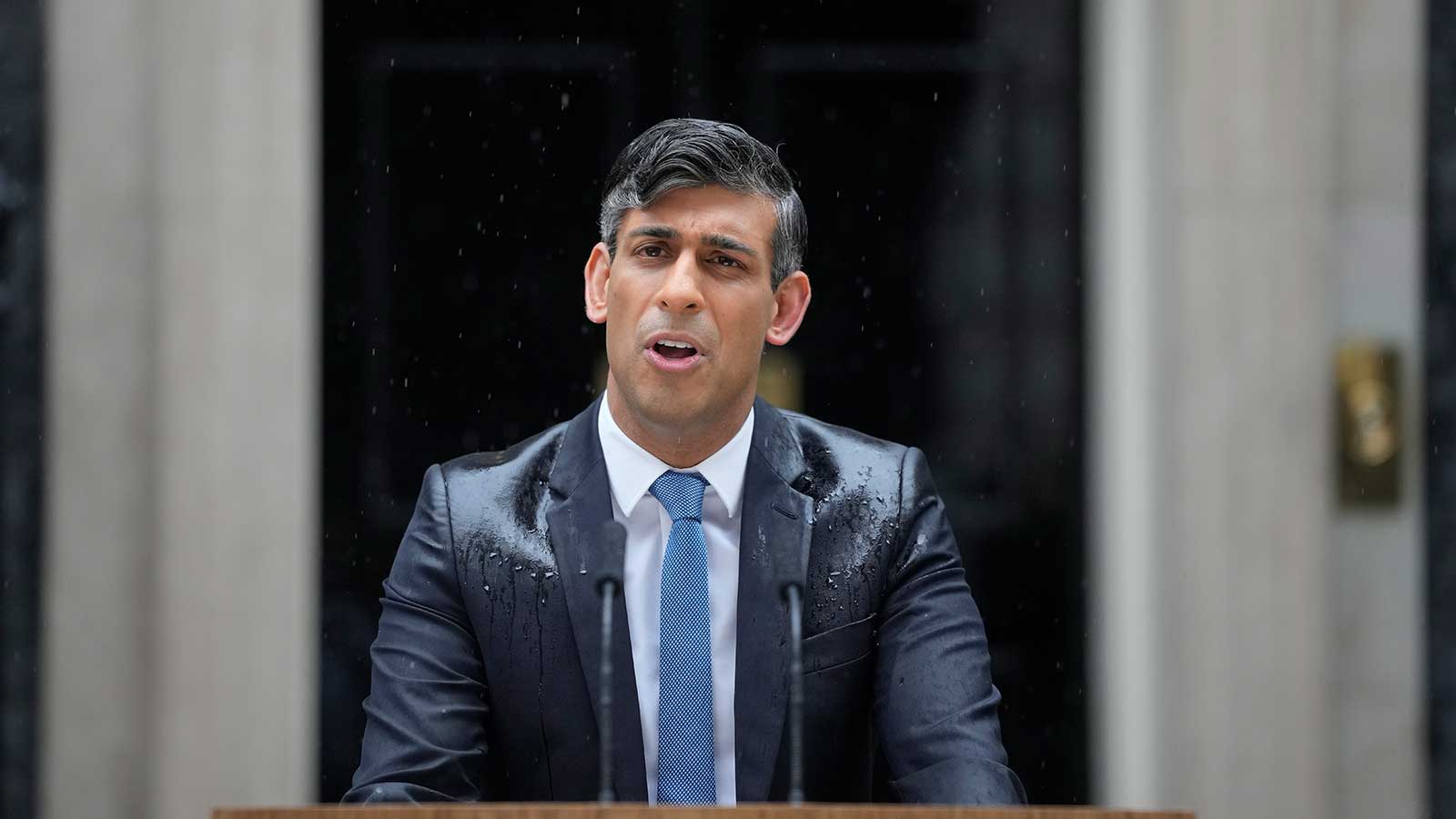Conservative MPs were in full-blown panic mode on Wednesday after hearing speculation that Prime Minister Rishi Sunak was about to call a snap election, despite his governing Conservative Party polling at one of its worst levels in living memory.
One Tory MP informed me early in the morning they’d been told the news many within the party had been dreading by the chief whip the night before, and after being leaked to the press the rumor mill in Westminster went into overload.
The news was confirmed around tea time when a lectern was placed outside of Downing Street without the U.K.’s coat of arms — a sign to show the upcoming statement wasn’t regarding government business, but a party political announcement.
It was what they had all feared — a general election on July 4.
As the U.K. prime minister delivered his announcement, the rain clouds opened over Westminster, transforming the statesman into something resembling a drowned rat as he returned to his bunker at 10 Downing Street. A sign of things to come?
The announcement has been met with bewilderment by some. The government had until January to call the next election, and with the Conservative Party currently languishing 20 points behind the opposition Labour Party in the national polls, surely this amounts to political suicide?
Well, here’s what I believe Rishi Sunak and his team have been thinking and why they have hit the gas and gone early.
The reality, his advisors will argue, is that the current political and economic landscape may be as good as it gets for the Conservatives who have been in power since 2010.
Earlier this month, the U.K. crawled out of recession as its economy started showing signs of life, growing by 0.6 percent in the first three months of the year — Britain’s fastest economic growth in two years.
This was followed by Tuesday’s announcement that the U.K. inflation rate had fallen to 2.3 percent, down from the 11.1 percent recorded in October 2022. The figure still remains just shy of the Bank of England’s 2 percent target but has reached its lowest level in almost three years.
It’s clear that a smattering of good economic news has been enough to convince Sunak that now is the time to go, firing the gun on a summer election, but is it enough?
The U.K. economy is performing at an acceptable level. It is currently outpacing the United States, France, Germany, and the wider Eurozone, so much so that the IMF revised its forecast upwards for GDP growth this year from 0.5 percent to 0.7 percent and predicted further strengthening in 2025, but this isn’t being felt yet on the street.
Anecdotally, prices still feel too high in the supermarkets and interest rates remain at a daunting level for mortgage holders and first-time buyers. Is Sunak thinking people will stop feeling the pinch in just six weeks’ time?
Many Conservative MPs believed the government would allow time for the first deportation flights to take off to Africa after the recent passing of the prime minister’s flagship Rwanda asylum policy. Throw in some tax cuts in the Autumn Statement and see how the land lies in October.
However, is his decision to go to the country so early evidence of a lack of belief in his ability to deliver on such pledges?
According to the Office for National Statistics (ONS), U.K. public debt to GDP was 98.3 percent at the end of March 2024, 0.7 percentage points higher than the Office for Budget Responsibility’s (OBR) estimate. Promising substantial tax cuts on the back of such high national debt is problematic as Sunak, a former Chancellor, knows all too well.
Meanwhile, an early election avoids the potentially devastating optics that a summer of uncontrolled mass immigration across the English Channel would bring. Many within Sunak’s own party do not have faith in the effectiveness of the Rwanda policy to stem the migratory flow, including former Home Secretary Suella Braverman and Immigration Minister Robert Jenrick.
Calls by backbench Conservative MPs to leave the European Convention on Human Rights to ensure its viability have been resisted by No. 10. Could it be that Sunak knows the policy is unworkable and will only lead to even greater discontent among the Conservative ranks?
As it stands, the governing party is heading for a historic electoral defeat. Polling at just 20 percent — a far cry from the 43.6 percent vote share amassed by Boris Johnson in 2019’s landslide victory — the Conservatives are facing the possibility of losing up to 250 seats.
Late on Wednesday evening, Fleet Street hacks were reporting that a potential rebellion within the party was seeking to oust the prime minister before the dissolution of parliament on May 30 in a bid to cancel the election.
Whether they succeed or not remains to be seen, but now that it’s been called, the optics of denying democracy look wholly unpalatable.
He could have waited. He arguably should have waited. But now, save for a form of divine intervention, many Conservative lawmakers are doomed to fail; nothing but lambs to the slaughter as Sir Keir Starmer lies in waiting to become the first Labour prime minister since Gordon Brown.





